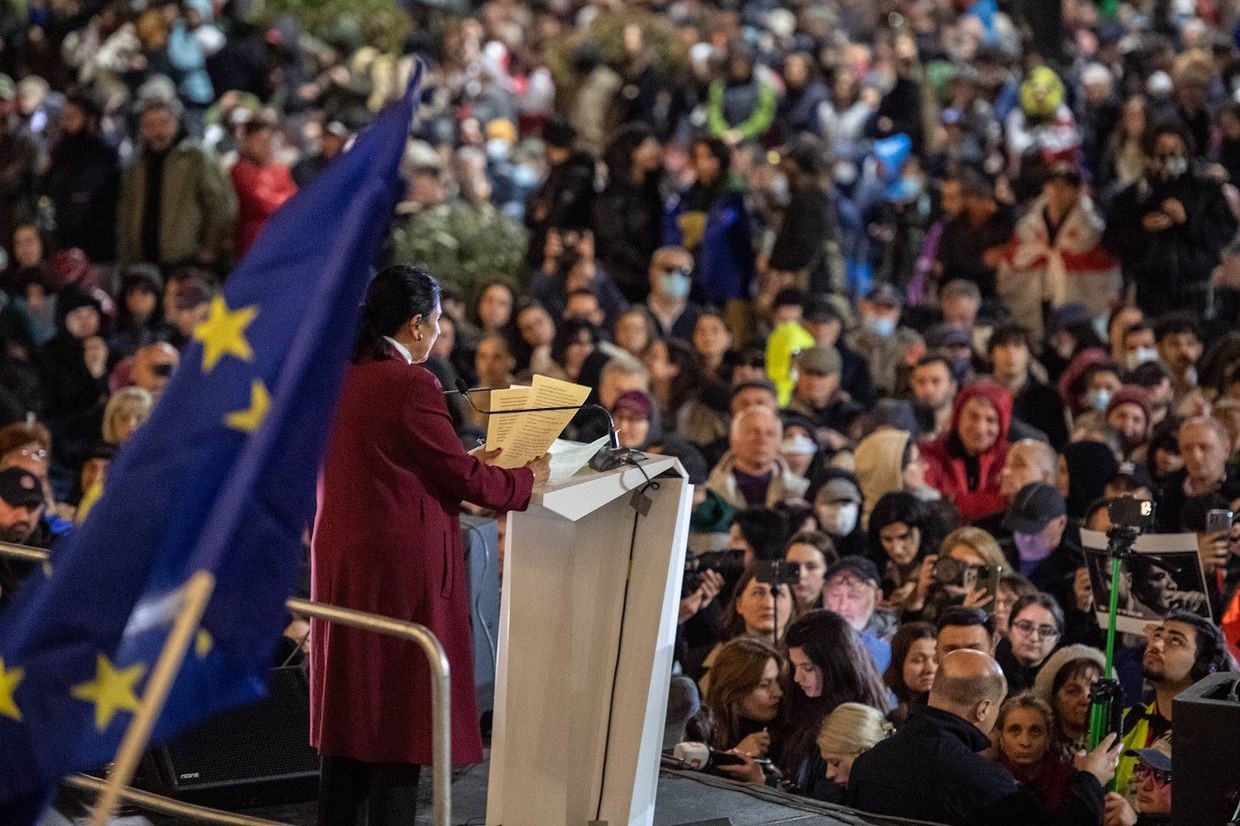
On the 34th anniversary of the referendum on the restoration of Georgia’s state independence, a large-scale demonstration was held in Tbilisi, during which fifth President Salome Zourabichvili announced the creation of a ‘platform of resistance’.
On Monday, thousands of people again gathered on Tbilisi’s central Rustaveli Avenue near the parliament building. It was the 124th day of protests demanding new parliamentary elections and the release of those detained during the demonstrations.
Speaking to those gathered, Zourabichvili stated that in order to achieve the goals of society, along with street protests, it was necessary to ‘give the struggle a political format’ and to ‘create a platform of resistance with the participation of the pro-European political spectrum’.
The platform’s main principle would that it would be open to all pro-European parties and groups ‘who are ready to put aside political incompatibilities’, she said, adding that these forces should share both main slogans of the protest, including that ‘new, fair elections should be called’ and that ‘prisoners of conscience should be released’.
Zourabichvili additionally noted that ‘the strength of the protest is not measured by the number of people who come out’, and that ‘after four months, standing tall is the accurate measure’.
According to her, there are three main pillars of the ‘regime’, including ‘the financial interests of the oligarch’s entourage’, referring to the founder of the ruling Georgian Dream party, billionaire Bidzina Ivanishvili.
Zourabichvili listed the remaining ‘pillars’ as Russian propaganda and propagandists ‘who are trying to deceive and subjugate the people’ and the ‘Russian violent system’.
Following her speech, Zourabichvili was lampooned by a variety of other opposition leaders.
In particular, her speech was mockingly criticised by Nika Gvaramia, the co-founder of the opposition group Coalition for Change.
‘Polonius: What are you reading, my lord? Hamlet: Words, words, words’, Gvaramia wrote on Facebook.
Similarly, former opposition politician and opera singer Paata Burchuladze called Zourabichvili’s speech a ‘diversion’.
‘We have to decide, because no one is doing anything. We are standing, waiting, and four months have already passed. We have been waiting for four months, and it turns out that the [fifth] president is going to form some kind of platform and she has to work something out’, he said.
‘I don’t understand what is happening at all. What took place today was a diversion. 100–150,000 people came out and [she] told us the story [...] how Georgia was formed. This cannot continue like this’.
‘If the people elect a leader, we must elect someone young, with a sharp mind, to lead all this’, Burchuladze added.
A controversial investigation committee and Zourabichvili’s silence
During Zourabichvili’s speech, RFE/RL reported that several demonstrators in the front rows shouted at her, asking what were her thoughts about the temporary investigation commision in the parliament, which is currently carrying out a probe into the former ruling United National Movement (UNM)’s time in power, including 2008 August War.
In her half an hour speech, Zourabichvili did not mention either the war or the commission, despite the banners held by demonstrators standing behind Zourabichvili demanding the release of imprisoned former president Mikheil Saakashvili.
The UNM, which ran in the October 2024 elections under the Unity — National Movement group alongside the Strategy Aghmashenebeli party, was in power between 2003–2012, and is most associated with Saakashvili. The party and Saakashvili have long been the primary targets for the ruling party’s ire and political retribution campaign.
Georgia’s current political crisis came to a head after Prime Minister Irakli Kobakhidze announced in late November that the government was halting Georgia’s EU bid until 2028, sparking daily mass protests during which more than 400 demonstrators were reported to have been detained thus far.
Since the protests began, law enforcement officers and unidentified masked people have assaulted a number of protesters, including tens of journalists covering the protests.











